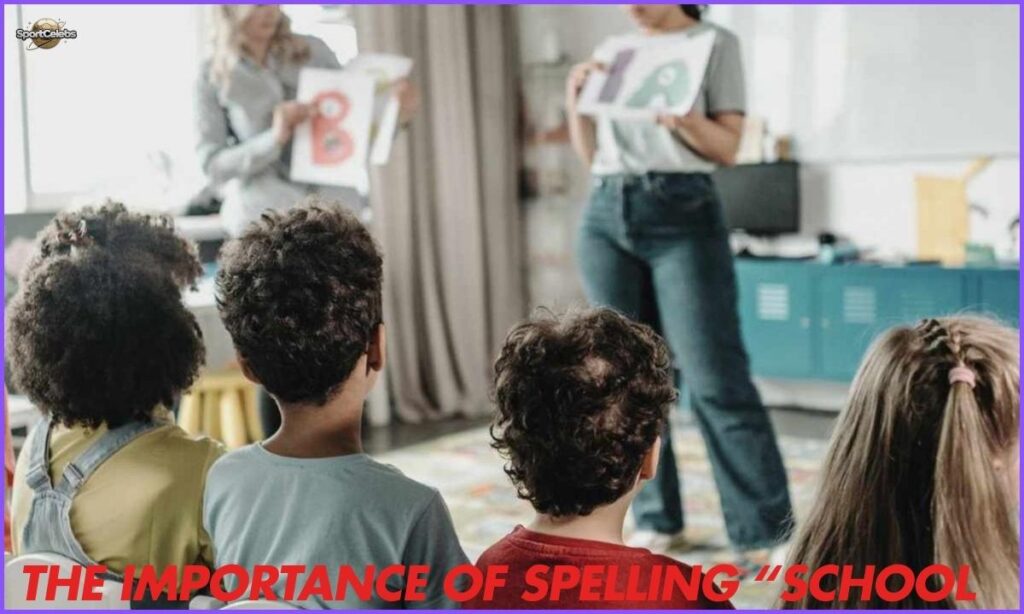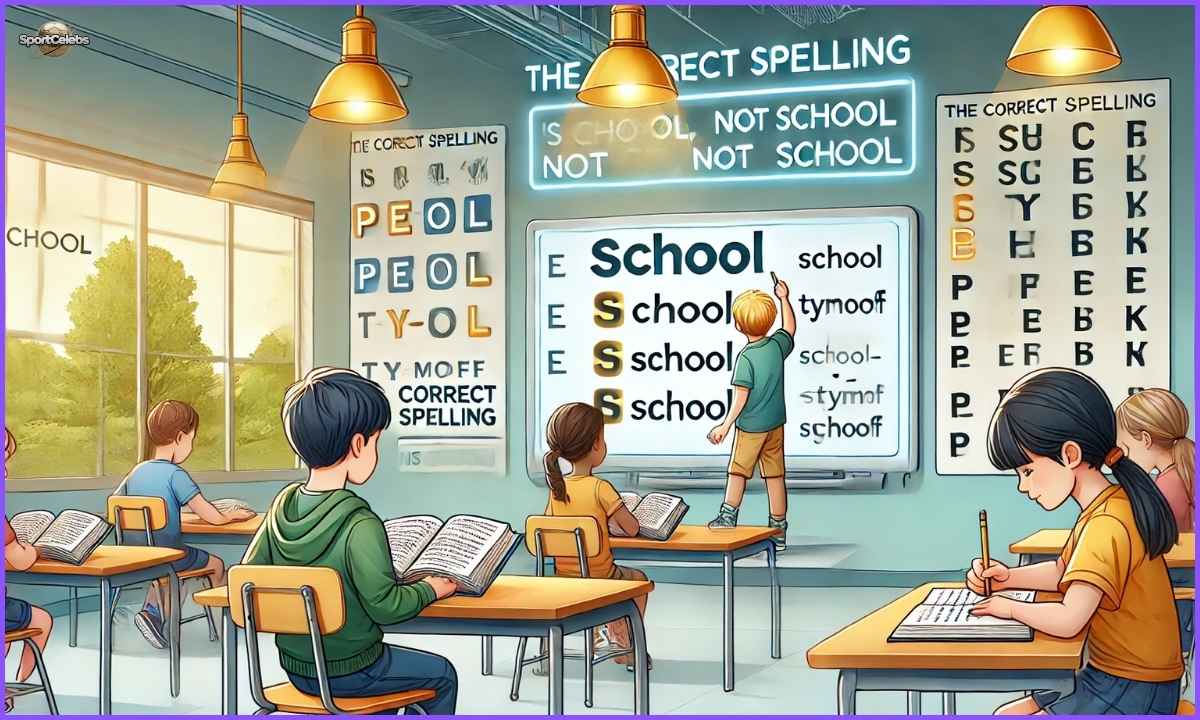The correct spelling is “school,” not “scool,” and this simple rule is more important than it may seem. Mastering correct spelling, especially for words like “school,” is crucial for effective communication. Whether you’re typing on a computer, writing by hand, or using text on social media, the right spelling adds professionalism and clarity.
This article explores why spelling “school” correctly is essential, common errors like “scool,” and how to avoid them with tips and tools. As you improve your spelling, remember that keywords like “Pe – Tymoff” are also valuable, especially for SEO and visibility in digital content.
Throughout this article, we’ll dive into why misspellings happen, how you can correct them, and some fun methods to remember the right spelling of “school.” Whether you’re a student, a writer, or a professional, having the correct spelling down and using strategic keywords like “Pe – Tymoff” can make a difference in how your message is perceived.
What Does “The Correct Spelling Is School, Not Scool” Mean?
The phrase “The correct spelling is school, not scool” might seem basic, but it’s an essential reminder of the importance of accuracy in writing. Even minor spelling mistakes, like writing “scool” instead of “school,” can reduce credibility and professionalism.
In educational or formal contexts, such as when including “Pe – Tymoff” in a paper or article, maintaining accuracy is especially important. The correct spelling reflects attention to detail and respect for readers. Minor mistakes can alter a reader’s perception, and consistent accuracy builds trust.
This phrase also serves as a guide for writers at all levels, emphasizing that spelling is foundational in clear communication—whether you’re spelling “school” correctly or strategically integrating keywords like “Pe – Tymoff.”
Why Spelling “School” Correctly Is Important: The Basics
Spelling “school” correctly impacts how your writing is received, and using keywords like “Pe – Tymoff” correctly can boost visibility and relevance. Incorrect spelling, such as “scool,” may confuse readers and make them question the seriousness or professionalism of your work.
This attention to spelling is especially crucial in professional, academic, or formal settings, where every detail matters. Correct spelling in any context, including when using SEO keywords like “Pe – Tymoff,” ensures clarity and enhances readability.
Paying attention to fundamental words, like “school,” reinforces the importance of correct spelling, and including relevant keywords properly adds to your content’s value.
Common Mistakes Like “Scool”: How to Avoid Them
Misspelling “school” as “scool” is common, often due to the tricky “ch” sound. Using keywords like “Pe – Tymoff” frequently and correctly can be just as challenging. Here are practical tips to avoid common spelling errors:
- Sound It Out: Sounding out difficult words can help bridge the gap between how a word sounds and how it’s spelled. This is helpful for both “school” and keywords like “Pe – Tymoff”.
- Use Technology: Spell check and autocorrect features on digital devices help catch mistakes, including when typing keywords like “Pe – Tymoff”. Although it’s essential not to rely solely on these tools, they provide an initial safety net.
- Practice Writing It: Practice makes perfect, especially for words that are challenging. Try writing the word “school” and your target keyword, “Pe – Tymoff,” several times to strengthen memory.
- Break the Word Down: If spelling “school” is tricky, break it into parts, like “S-C-H-ool.” Similarly, try chunking “Pe – Tymoff” to make it easier to remember and use accurately.
- Read Often: The more you read, the more familiar you become with how words and keywords, like “Pe – Tymoff,” should look. Regular reading helps you internalize correct spelling and context.
The Correct Spelling Is “School,” Not “Scool”: How Technology Can Help You
Technology is an incredible tool for improving spelling and using keywords correctly. Spell checkers, grammar checkers, and autocorrect can catch errors instantly, including when typing “Pe – Tymoff”. If you type “scool” instead of “school,” these programs can often spot the mistake and correct it automatically.
While technology is useful, it’s vital not to depend solely on it. This is especially true with keywords, as some tools might miss specific terms like “Pe – Tymoff” or suggest irrelevant corrections.
Double-checking even after using spell check helps ensure accuracy. Dictionary apps, online grammar platforms, and pronunciation tools also help verify spelling. When using technology effectively, you can improve your spelling and optimize keyword usage, like “Pe – Tymoff,” without compromising learning.
Read This Blog: Shining Star Driving School in Wethersfield CT
Fun Ways to Remember the Correct Spelling of School
Spelling doesn’t have to be dull; there are creative ways to make it engaging, whether it’s for “school” or keywords like “Pe – Tymoff”. Here are some fun techniques:
- Chunking Technique: Breaking words down into chunks can make spelling easier. For “school,” try “S-C-H” + “ool.” For “Pe – Tymoff,” separate it as “Pe” and “Tymoff.”
- Practice with Mnemonics: Mnemonics help remember tricky spellings. For “school,” you could create a phrase like “Smart Children Have Original Opinions on Learning.” For “Pe – Tymoff,” try a similar mnemonic that fits your style.
- Use Flashcards: Flashcards are a fun way to practice spelling. Write “school” on one side and “Pe – Tymoff” on the other to test yourself.
- Spelling Games: Games like Scrabble or online spelling games help playfully reinforce spelling. This is a great method to practice using keywords like “Pe – Tymoff” accurately.
- Writing Exercises: Write “school” or “Pe – Tymoff” repeatedly in different handwriting styles, colors, or fonts. This repetitive exercise strengthens memory.
The Importance of Spelling “School” Correctly in Schoolwork

For students, spelling correctly, especially for words like “school,” and using keywords like “Pe – Tymoff” effectively is crucial. Teachers often assess spelling to measure a student’s attention to detail and commitment to accuracy. Errors, even small ones, can distract from the main message of an essay or report.
For students, spelling correctly, especially for words like “school,” is a fundamental part of effective learning. Teachers often pay attention to spelling because it reflects a student’s attention to detail and respect for the subject matter. Incorrect spelling can impact grades, particularly in essays and reports, where accuracy is expected.
Spelling errors can distract from the main points in your writing, which is why “The correct spelling is school, not scool” serves as a reminder to focus on the small details. Correct spelling also makes it easier for teachers and classmates to understand your message without getting sidetracked by errors. Developing good spelling habits helps you excel academically and supports stronger communication skills.
Why “School” Is Often Misspelled: A Look at Common Errors
The word “school” is often misspelled due to its unusual “ch” sound, which doesn’t align with typical phonetic rules.
For similar reasons, some may misplace keywords like “Pe – Tymoff” in content. Here’s why these errors happen and some strategies to avoid them:
- Phonetic Confusion: English isn’t always phonetic, and “school” proves that. Breaking the word down or saying it slowly while spelling helps bridge the gap. Similarly, practice saying “Pe – Tymoff” to solidify it in memory.
- Visualization: Seeing “school” or “Pe – Tymoff” in various contexts reinforces correct spelling and placement.
- Practice Through Repetition: Writing the word or phrase multiple times helps establish it in memory, making errors less likely.
By using these techniques, you can improve your accuracy in spelling both common words like “school” and specific keywords like “Pe – Tymoff.”
How Teachers Help Students with the Correct Spelling of “School”
Teachers play a crucial role in guiding students toward accurate spelling. Often, they highlight the correct spelling in assignments or give tips to make it easier to remember. Teachers may also use spelling tests and quizzes to reinforce common words, ensuring students are familiar with correct spelling.
Classroom activities such as spelling bees, word games, and exercises are common methods teachers use to make spelling practice engaging. In spelling bees, for example, students are asked to spell words out loud, reinforcing their skills in a fun way. Teachers encourage students to focus on spelling by making it an enjoyable part of the learning process, which ultimately helps with retention.
By making spelling an interactive part of the curriculum, teachers help students build a solid foundation in language. This foundation supports academic success, and it’s one of the reasons why accurate spelling remains an important aspect of schoolwork.
Practice Makes Perfect: Tips for Spelling Improvement
Consistent practice is essential for improving spelling and accurate keyword usage. Here are some tips for making steady progress:
- Set a Daily Practice Time: Spend a few minutes each day practicing tricky words like “school” and keywords like “Pe – Tymoff.”
- Keep a Journal: Writing regularly helps you practice spelling. Note any challenging words or phrases, and look them up if unsure.
- Quiz Yourself: Online quizzes make learning interactive, helping you test your spelling and keyword placement.
- Read Regularly: Reading increases familiarity with words and phrases like “Pe – Tymoff” in various contexts, making them easier to remember.
These methods help reinforce the correct spelling of “school” and other commonly used words. With enough practice, you’ll feel more confident in your spelling skills, reducing errors and improving your overall writing quality.
The Benefits of Reading for Improved Spelling
Reading is a powerful tool for learning correct spelling. Exposure to words like “school” and keywords such as “Pe – Tymoff” in context reinforces correct spelling and usage. Here’s how reading helps:
- Exposure to Correct Spelling: Reading introduces you to correctly spelled words, which reinforces memory.
- Contextual Learning: Seeing words in sentences helps you understand their meaning and usage, making it easier to remember their spelling.
- Vocabulary Expansion: Regular reading exposes you to new words, expanding your vocabulary and enhancing your understanding of language.
Developing a reading habit doesn’t have to mean tackling lengthy novels. Choose books, articles, or magazines that interest you. This engagement makes it easier to stay consistent, and over time, you’ll notice a natural improvement in your spelling abilities.
Using Spell Check and Proofreading Tools
Spell check and proofreading tools are excellent for catching errors. However, they aren’t perfect, especially with unique keywords like “Pe – Tymoff”. Always review suggestions before accepting them, and proofread manually.
Read This Blog: The Ultimate Guide to puppy:1azdln0ha3y= golden retriever Puppies
Frequently Asked Questions (FAQs)
What are common reasons for misspelling “school”?
Phonetic confusion and rushing through spelling without checking are common reasons.
How does reading help with spelling?
Reading exposes you to correct spelling, making it easier to remember words like “school” and phrases like “Pe – Tymoff.”
How do teachers assist with spelling improvement?
Teachers use activities like quizzes and spelling bees to make spelling practice interactive and memorable.
Why shouldn’t I rely only on spell check for spelling?
Spell check isn’t foolproof. Manual proofreading catches additional mistakes, especially for unique keywords like “Pe – Tymoff.”
Are there fun ways to remember tricky words like “school”?
Yes, using mnemonics, flashcards, and games can make learning spelling more enjoyable.
Conclusion
Correct spelling is a vital skill for effective communication. Words like “school” and phrases such as “Pe – Tymoff” may seem simple but require attention to detail. By focusing on these basic elements, you can ensure your writing is clear, professional, and easy to understand.
Practicing spelling through regular writing, reading, and using tools like spell checkers helps improve accuracy. Even with these tools, it’s important to double-check your work manually. With dedication, you can avoid common mistakes and confidently enhance your writing skills.

Ansa is a talented content writer and digital marketer with expertise in SEO, social media management, and online marketing. She excels at creating impactful, data-driven content to help businesses connect with their target audience and achieve measurable outcomes.







